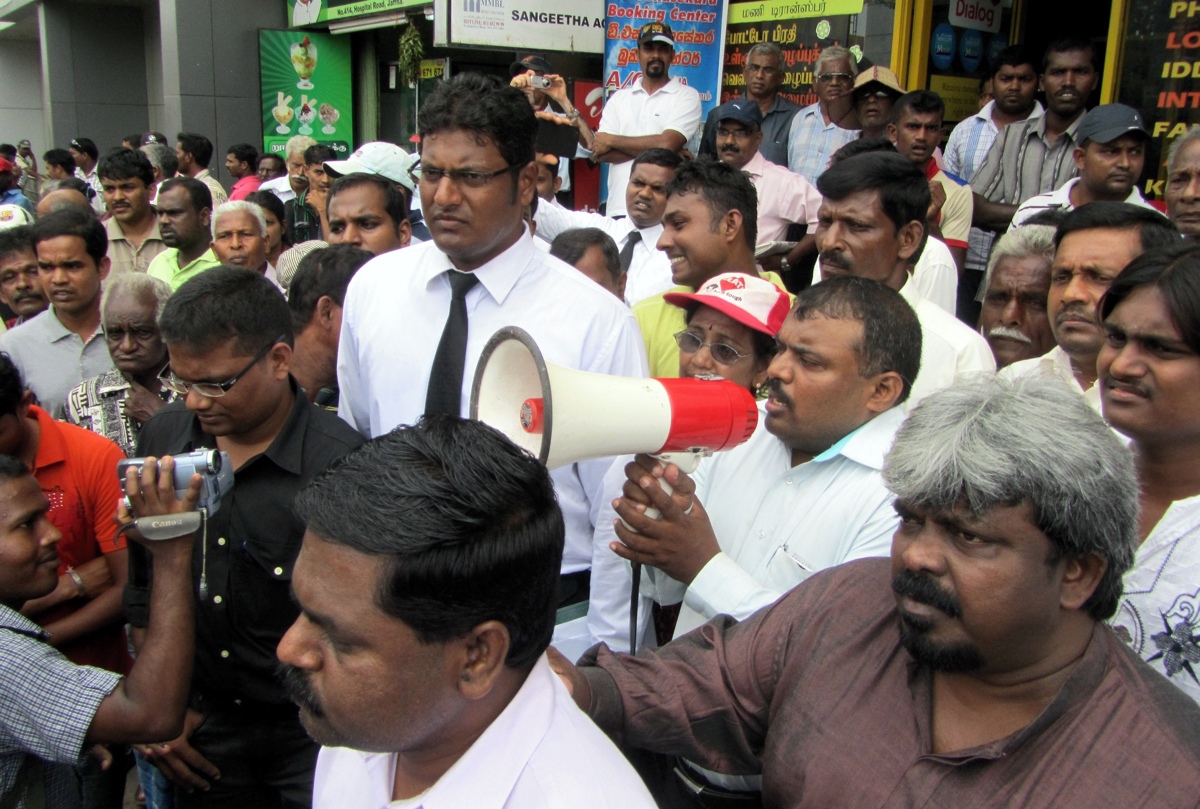Q: Did the GTF and the BTF pressure former UK Foreign Secretary, David Miliband to rush to Colombo in April 2009 in a bid to persuade President Rajapaksa to halt the offensive? Miliband is on record as having told the US mission in London (according to Wiki Leaks) how he spent 60 per cent of his time on the SL issue, because of impending parliamentary polls.
A: Like I said before, the GTF came into being only after the end of the war. However, the answer to your question is yes, we did pressure the then British government as members of the BTF and the Diaspora community with loved ones caught up in the so called ‘no fire’ zone. It didn’t take too much of persuasion for Mr David Miliband or for other world leaders to see what was happening as reports and evidence of massacres and carnage were coming out regularly. It is a shame that there was a deafening silence from communities in the country outside the war zone and from local journalists who kept numb without reporting independently.
Regarding WikiLeaks - it is interesting isn’t it that in the same token of reporting what Mr Miliband had said or otherwise, it also reports that President Rajapaksa and the brothers were responsible for war crimes and crimes against humanity.
Q: On the basis of the ‘Darusman report’––The Island recently revealed how UNSG’s Panel of Experts (PoE) had collected information/petitions and UK productions, ‘Sri Lanka’s Killing Fields’ and ‘Sri Lanka’s Killing Fields: War Crimes Unpunished’––the GTF and various other Diaspora groups allege massacre of many thousands of men, women and children. A British MP, who recently raised UK Foreign Secretary, William Hague’s failure to expel the Sri Lankan Defence Attache in London, for killings committed during January-May 2009, last year, claimed that the final phase of the conflict claimed the lives of 40,000 civilians and 60,000 LTTE cadres. There were many other examples. ‘Tamils for Obama’ said fighting during the final few weeks claimed the lives of 75,000 civilians. How many Tamil civilians perished in the fighting? How many LTTE cadres died in action?
A: I can only go by credible reports such as the one by the United Nations Panel of Experts, which states that an estimated 40,000 men, women and children died during the last weeks of the war. Also Bishop Rayappu Joseph of Mannar alleged at the Lessons Learnt and Reconciliation Commission (LLRC) that over 146,000 people are missing.
As you have quite rightly pointed out, that there are various estimates and quotes exist. The best way to resolve this issue and other related issues is to allow an independent international investigation to establish a credible figure. If the government of President Rajapaksa has nothing to hide, they must permit such an investigation to clear these allegations once and for all, will be my advice.
Q: Do you have any idea of the LTTE fighting strength at the onset of the fighting in mid 2006? How many survived?
A: No idea and this could be another issue that can be resolved credibly, if such an investigation as described above is carried out.
Q: How do you view President Rajapaksa’s efforts to set up a Parliamentary Select Committee (PSC) to resolve the problem?
A: These are delaying tactics.
President Rajapaksa appointed the All Party Representative Committee (APRC) under Prof. Tissa Vitharana a few years ago for the same purpose of coming to a consensus agreement between the parliamentary parties in finding a political solution. I would like to know what the President did with those recommendations.
A ‘popular’ President like Mahinda Rajapaksa, who was elected almost 100% with the Sinhala vote, who also commands a two third majority in ‘parliament’ could have resolved the Tamil political problem with ease if he had the political will and courage, at least since the end of the war, over three years ago.
Q: Do you think President Rajapaksa is genuine in his efforts? Or just trying to deceive your people?
A: No, I don’t believe President Rajapaksa is genuine in his efforts as proof of the pudding is in the eating, as they say. Like I said before, a ‘popular’ President like Mahinda Rajapaksa who got elected almost 100% through the Sinhala vote, who also commands a two thirds majority in parliament could have resolved the Tamil political problem with ease if he had the political will and courage, at least since the end of the war, over three years ago.
I am sure he also fears that his vote base, which is an almost all Sinhala vote base, might deny him the votes, if he takes the bold and just step to resolve Tamil grievances.
President Rajapaksa is in a hell of a predicament also because as the Commander in Chief of the Military, he is alleged to have committed war crimes and crimes against humanity. With mounting evidence, he is trying to negotiate, perhaps barter justice with a political solution as he knows that the day he relinquishes his position as head of state, he is likely to be arrested just as Charles Taylor of Liberia or Milosevic of former Yugoslavia.


